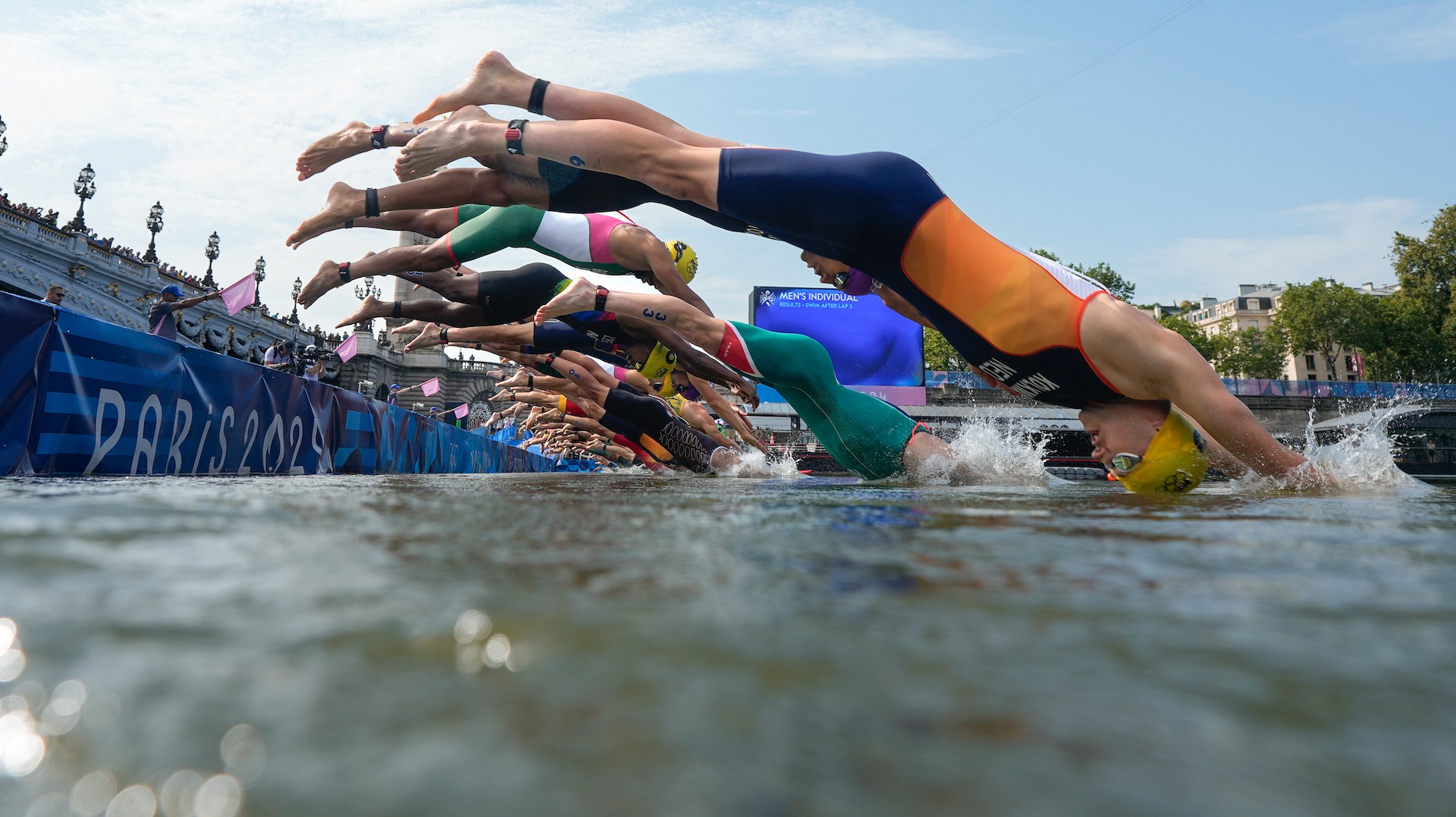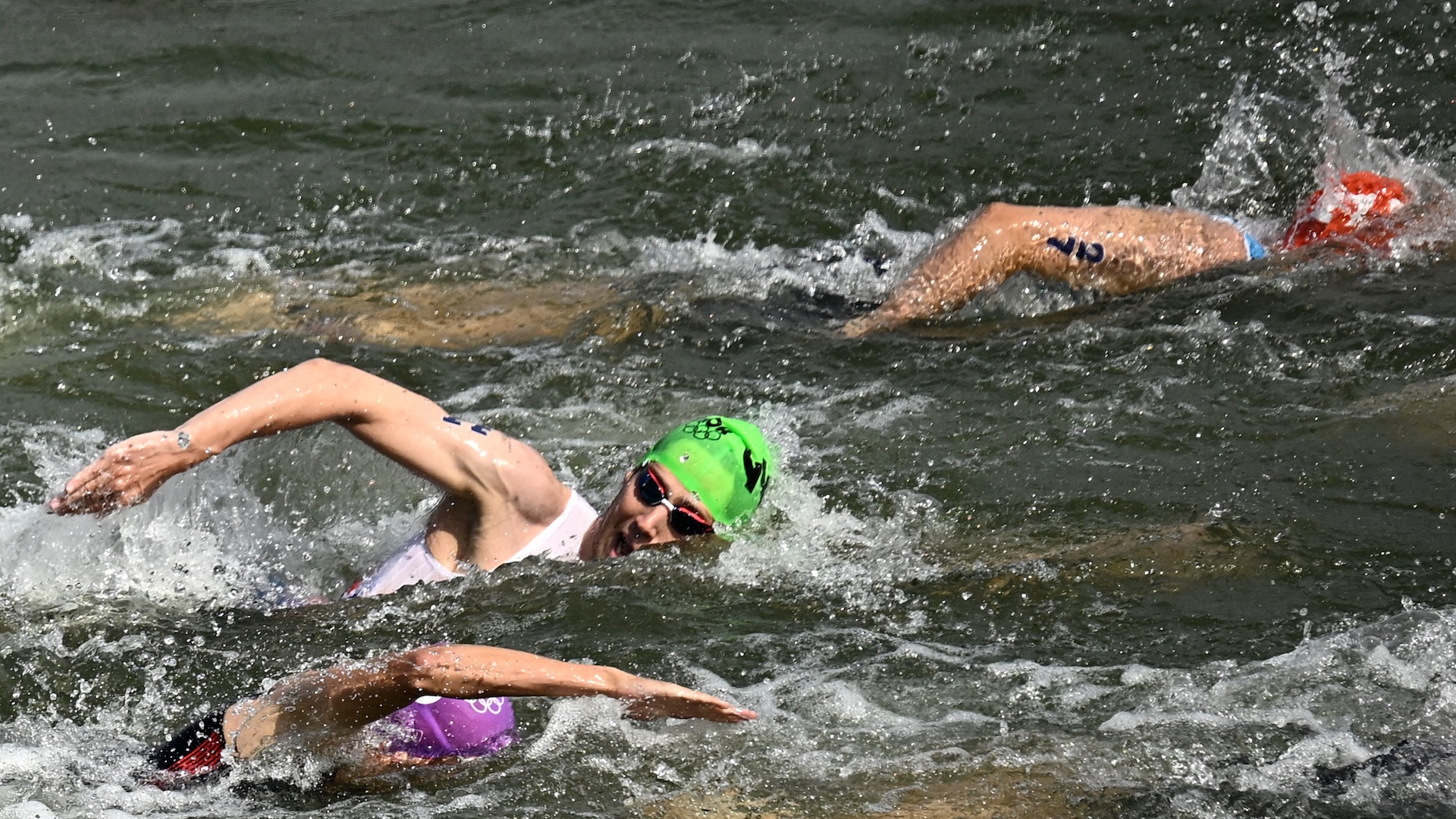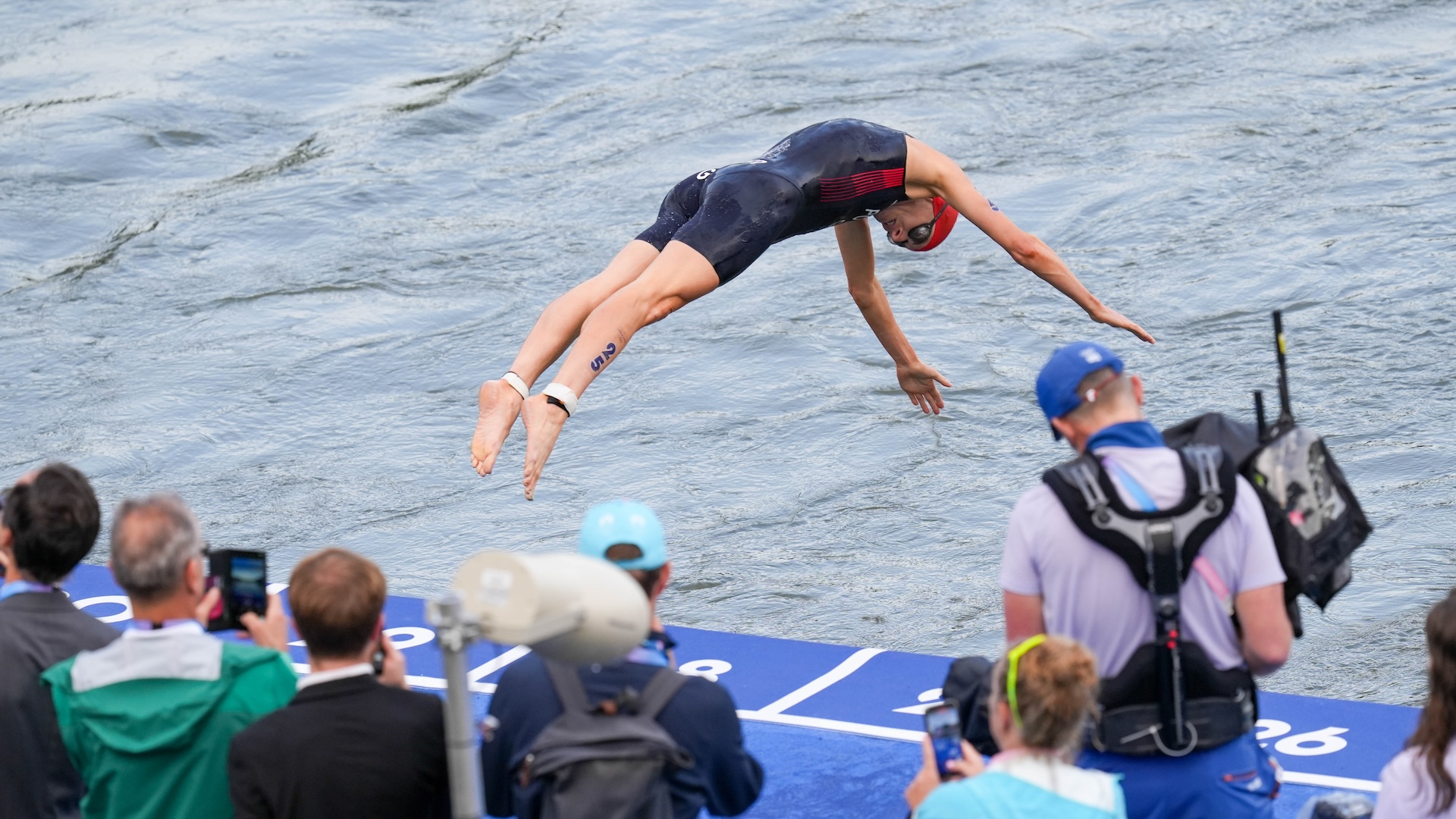
Rain showered down on athletes, onlookers, can-can dancers and opera singers at the 2024 Paris Olympics opening ceremony on July 26, and more rain over the weekend reportedly drove an uptick in disease-causing bacteria in the Seine river.
This decline in water quality prompted officials to cancel the swimming portion of a training session for the triathlon events, and the men's race, scheduled for Tuesday (July 30), was postponed. Finally, on Wednesday (July 31), both the women's and men's triathlons were allowed to proceed, with athletes plunging headfirst into the Seine for a 0.9-mile (1.5 kilometers) swim before jumping onto bikes for the next leg of the race.
France and Great Britain snagged gold in the women's and men's races, respectively. But even as the athletes take the podium, there's more river swimming to come, as the mixed relay and marathon swimming events are scheduled for next week.
Are there any lingering concerns about the water quality in the Seine? And what risks could subpar water pose to the competitors? Live Science spoke with experts to find out.
Related: Will Olympic athletes ever stop breaking records?
Poop pollution
Paris invested the equivalent of $1.5 billion in making the Seine swimmable in time for the Olympics. The renovation involved connecting thousands of residences to municipal sewer systems and constructing a huge underground cistern. This massive tank, which holds 20 Olympic swimming pools' worth of water, is intended to prevent untreated sewage from flowing into the river.
Paris has a combined sewer network that captures stormwater and wastewater, funneling both to treatment plants. But in times of heavy rain, some untreated water is instead diverted into the Seine and its tributaries to prevent disastrous backups. The new basin beneath Paris helps curb such outflows by capturing excess water and then slowly releasing it back into the sewers so it can go through the normal treatment process.
This cistern was completed in May. But even so, when it rains in Paris, the quantity of bacteria-carrying poop in the Seine still spikes. In particular, rain comes with an uptick in Escherichia coli, a bacterium found in both human and animal feces.
"Elevated E. coli levels are to be expected following rain events," Sarah Lowry, a doctoral candidate in environmental engineering at Stanford University, told Live Science in an email. E. coli acts as a general indicator of fecal contamination, so its presence implies that other common poop-borne pathogens, such as norovirus and Salmonella, are likely also in the water. In addition to the germs from human wastewater, some of these pathogens come from animal feces that get washed into the river, Lowry noted.

After such an influx of poop, one can expect the related pathogens to then decline due to sun exposure and fluctuating temperatures in the water. In terms of how long that takes, "we are talking about days, not weeks in general," Patrick Gurian, a professor and the head of the Environmental Engineering Program at Drexel University, told Live Science in an email.
"In general, if levels of E. coli rise in a natural, moving body of water because of runoff from rain, those levels should start to drop when the rain stops," said Mia Mattioli, the team lead for the Environmental Microbiology and Engineering Laboratory within the Centers for Disease Control and Prevention's (CDC) Waterborne Disease Prevention Branch.
Related: What are the most polluted cities in the world?
"However, the time it takes for the levels to drop will depend on upstream runoff, surrounding land use, and drainage systems," Mattioli told Live Science in a written statement. Additional factors, such as the cloudiness of a given body of water, can also affect how quickly germs die off, Lowry added. "It's hard to say without knowing the specifics of a particular site," she said, but it typically takes one to two days.
Following the weekend's rain, another rainstorm hit Paris in the early morning hours Wednesday, The Washington Post reported. A few hours later, organizers met to discuss the results of the latest water-quality tests and deemed the water safe for racing. The rain let up around when the women's race started at 8 a.m.
"The results of the latest water analyses, received at 3:20 a.m., have been assessed as compliant by World Triathlon allowing for the triathlon competitions to take place," the organizers said in a statement sent to news outlets Wednesday. However, the Olympic organizers previously said the water samples used to make these decisions are taken 21.5 hours prior — which means they would have been taken before Wednesday's rainstorm. The test results from Wednesday have yet to be released.

What's the risk?
World Triathlon, the international governing body for triathlons, bases its water safety guidelines on the European Union's Bathing Waters Directive. These guidelines set a threshold for the E. coli level that's considered safe enough for swimming in inland waters: 900 colony-forming units per 100 milliliters (CFU/100mL).
That number came from epidemiological studies that looked at rates of illness among swimmers and then correlated them with the levels of an indicator bacterium, such as E. coli, in the body of water where they swam, Lowry explained. Such thresholds are specific to a given geography and type of water — salt versus fresh — so "there is no one number that is 'best' to set a threshold," she noted. That's why standards may vary among locations.
Paris Mayor Anne Hidalgo and Paris 2024 Chief Tony Estanguet took a dip in the Seine two weeks prior to the Games to demonstrate their confidence in its cleanliness. But notably, data later showed that E. coli levels were 985 CFU/100mL that day, The Associated Press reported. That's slightly above the "sufficient" threshold set forth in the guidelines.
So, what's the potential risk of swimming in poop-contaminated water?
In general, the various disease-causing germs found in feces can cause stomach cramps and diarrhea, which can lead to dehydration, Mattioli said. They can also cause ear, eye, respiratory and wound infections. "CDC cannot speak to the status of the Seine at present and defer to French authorities who are monitoring the water quality," she added.
E. coli, specifically, is not always a threat to human health — in this context, the microbe is being used as a benchmark to see if there's likely a concerning amount of poop in the water, Lowry emphasized. Most E. coli strains are harmless, but some can cause gastrointestinal problems and urinary tract infections. One type, called Shiga toxin-producing E. coli, can spark more-serious illnesses, involving bloody diarrhea and, in some cases, blood clots and kidney damage.
An individual's likelihood of getting sick after swimming in poop-contaminated waters varies depending on their existing immunity and their degree of exposure to the germs, Lowry said.
"The amount you ingest is usually the problem," Gurian said. Skin exposure can be an issue in some cases, but "by and large, the less you drink, the safer you are." In addition to avoiding swallowing the water, swimmers can protect themselves by wearing earplugs, nose plugs and goggles; covering any open wounds as much as possible with waterproof bandages and changing those bandages after swimming; and showering after swimming, Mattioli said.
Current weather forecasts suggest that more rain could befall Paris in the coming days, so the Seine's quality may continue to fluctuate. Only time will tell if the upcoming scheduled races will be postponed, downgraded to exclude swimming or moved to alternate arenas — or if anyone will wind up ill after braving the river's waters.
Ever wonder why some people build muscle more easily than others or why freckles come out in the sun? Send us your questions about how the human body works to community@livescience.com with the subject line "Health Desk Q," and you may see your question answered on the website!







